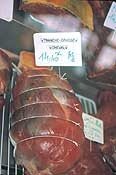
For years, visitors to a
country famed for its sophistication have been intrigued to see
the plaster horse heads hanging over butcher shop doors. "I
thought it meant they used horses to take their meat to market.
I had no idea it meant you should eat them!" shrieked one
British tourist when she found out what the symbol stood for.
"France is famed for its culture and progressive thinking,
so it's hard to understand how our horses can end up on a dinner
plate," laments Fran«oise Le Villon, local representative
of the French League for the Protection of the Horse. Le Villon
isn't the only one to wax indignant about the fate of an animal
most people see as a friend and companion, rather than a
gastronomic speciality.
Sadly, meat phobias created by the recent mad cow and
hoof-and-mouth crises mean the country's flesh eaters have begun
to seek alternatives. In fact, worried equine protection leagues
report that horsemeat sales rose 10 percent in 2001, with horse
steak—for the first time ever—selling for more per kilo than
beef.
"Over the last few months, our profits have soared 30 to 40
percent, and we expect to sell more than 50,000 tons of horse
next year," boasts Michel Beaubois, president of the French
Federation of the Hippophagique Butcher Shops.
Inevitably, with such a huge rise in consumption, meat sellers
can't satisfy demand, and horse rustling is making a comeback,
with unscrupulous thieves stealing family companions and making
huge profits selling them for meat.
With 310,250 horses killed for the dinner table each year,
France outstrips most of its hippophagic neighbors. Eighty
percent of equines are imported, not just from other European
countries, but from Argentina, Canada and the United States.
While most Americans are opposed to eating horsemeat, few people
realize that the horsemeat industry in the United States rivals
beef and pork in the quantity shipped abroad. This is according
to Equine Advocates, a U.S. organization set up in 1996 to
combat the problem. According to USDA figures, approximately
100,000 U.S.-bred horses are slaughtered in the country's three
horse slaughter plants and then sent to countries like France.
Equine Advocates won a major victory in November 1998 when the
state of California voted to make horse slaughter for human
consumption illegal. Breeding, selling or transporting horses
from the state for human consumption is also illegal now. But to
be effective, other states must follow suit.
"Often, the animals are in such terrible condition that
they have to be put down anyway," says Rolande Trolliet, a
member of the group. Trolliet provides homes for slaughterhouse
rescues and says she often feels isolated when it comes to
taking action against dealers who mistreat animals. "There
are just too many cases to deal with, and if a horse dealer has
influential friends, there's almost nothing you can do about
it," she admits.
Trolliet laments says that too many of her compatriots see
horses as "hamburgers on legs." Says she, "The
horse has been our partner across the centuries in the fields,
in the mines and on the battlefields of Agincourt and Verdun.
Surely he deserves a better end than this?"
|